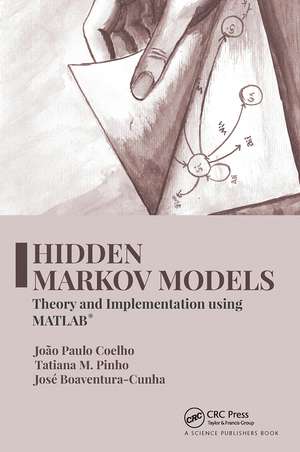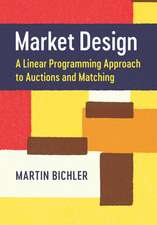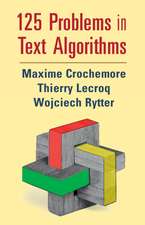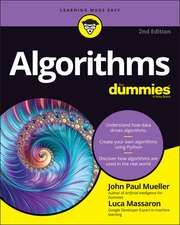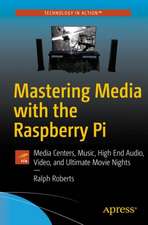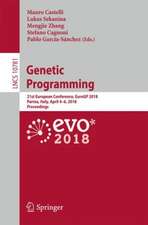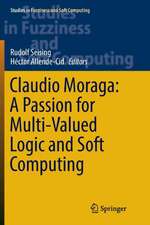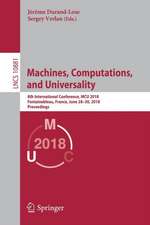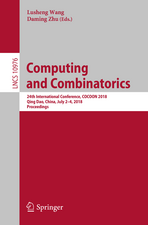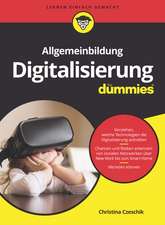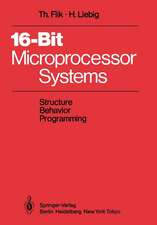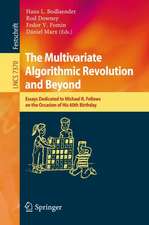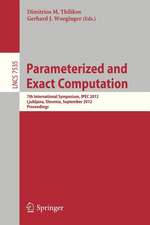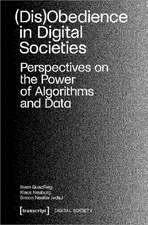Hidden Markov Models: Theory and Implementation using MATLAB®
Autor João Paulo Coelho, Tatiana M. Pinho, José Boaventura-Cunhaen Limba Engleză Paperback – 31 mar 2021
Key Selling Points:
- Presents a broad range of concepts related to Hidden Markov Models (HMM), from simple problems to advanced theory
- Covers the analysis of both continuous and discrete Markov chains
- Discusses the translation of HMM concepts from the realm of formal mathematics into computer code
- Offers many examples to supplement mathematical notation when explaining new concepts
| Toate formatele și edițiile | Preț | Express |
|---|---|---|
| Paperback (1) | 384.91 lei 6-8 săpt. | |
| CRC Press – 31 mar 2021 | 384.91 lei 6-8 săpt. | |
| Hardback (1) | 1163.91 lei 6-8 săpt. | |
| CRC Press – 13 aug 2019 | 1163.91 lei 6-8 săpt. |
Preț: 384.91 lei
Preț vechi: 481.13 lei
-20% Nou
Puncte Express: 577
Preț estimativ în valută:
73.67€ • 76.70$ • 62.25£
73.67€ • 76.70$ • 62.25£
Carte tipărită la comandă
Livrare economică 11-25 martie
Preluare comenzi: 021 569.72.76
Specificații
ISBN-13: 9780367779344
ISBN-10: 036777934X
Pagini: 282
Dimensiuni: 156 x 234 x 15 mm
Greutate: 0.45 kg
Ediția:1
Editura: CRC Press
Colecția CRC Press
Locul publicării:Boca Raton, United States
ISBN-10: 036777934X
Pagini: 282
Dimensiuni: 156 x 234 x 15 mm
Greutate: 0.45 kg
Ediția:1
Editura: CRC Press
Colecția CRC Press
Locul publicării:Boca Raton, United States
Cuprins
Introduction
1. Probability theory and stochastic processes
2. Discrete hidden Markov models
3. Continuous hidden Markov models
4. Autoregressive Markov models
5. Selected Applications
Glossary
References
Index
Notă biografică
João Paulo Coelho is an adjunct professor, and currently the Electrical Engineering course director, at the Polytechnic Institute of Bragança. He is also a researcher at CeDRI and holds a Ph.D. degree in computational intelligence applied to agricultural greenhouses. He has been involved, as a researcher member, in several scientific projects at both the national and European level. His research interests include control systems design, machine learning, electronic instrumentation, embedded systems and discrete-event computer simulation.
Tatiana M. Pinho graduated in Energy Engineering from the University of Trás-os-Montes e Alto Douro (UTAD), Portugal in 2011 and received the MSc degree in Energy Engineering from UTAD in 2013. In 2018, she received the Ph.D. degree in Electrical and Computer Engineering in UTAD and INESC TEC Technology and Science, supported by the FCT. Presently she is a postdoctoral researcher at the INESC TEC and her research interests include systems’ modeling and adaptive control.
José Boaventura-Cunha graduated in Electronics and Telecommunications Engineering and has a Ph.D. degree in Electrical and Computer Engineering. Presently he is an Associate Professor with habilitation at the UTAD University, a senior researcher at the INESC-TEC and member of IFAC and IEEE. He has coordinated/participated in several national and international research projects aiming the development of new instrumentation, modelling and control technologies applied to agriculture. His research interests include modeling, system identification and adaptive control.
Tatiana M. Pinho graduated in Energy Engineering from the University of Trás-os-Montes e Alto Douro (UTAD), Portugal in 2011 and received the MSc degree in Energy Engineering from UTAD in 2013. In 2018, she received the Ph.D. degree in Electrical and Computer Engineering in UTAD and INESC TEC Technology and Science, supported by the FCT. Presently she is a postdoctoral researcher at the INESC TEC and her research interests include systems’ modeling and adaptive control.
José Boaventura-Cunha graduated in Electronics and Telecommunications Engineering and has a Ph.D. degree in Electrical and Computer Engineering. Presently he is an Associate Professor with habilitation at the UTAD University, a senior researcher at the INESC-TEC and member of IFAC and IEEE. He has coordinated/participated in several national and international research projects aiming the development of new instrumentation, modelling and control technologies applied to agriculture. His research interests include modeling, system identification and adaptive control.
Recenzii
"A distinguishing feature of this book is that it provides the MATLAB code for the various algorithms covered. This would make it an excellent text for a course in the subject, as it would enable the students to experiment themselves with the algorithms encountered. Another good feature is that each chapter ends with a clear summary. All libraries serving programs in computer science should acquire this volume, and it would be worth considering as a textbook by instructors teaching courses on hidden Markov models."
— R. Bharath, emeritus, Northern Michigan University in CHOICE magazine
— R. Bharath, emeritus, Northern Michigan University in CHOICE magazine
Descriere
It presents analysis of both continuous and discrete Markov chains. It deals with concepts in a generic way, most books on Hidden Markov Models focus on speech processing applications. It presents the translation of Hidden Markov Models concepts from the realm of formal mathematics into computer codes using a high-level language.
